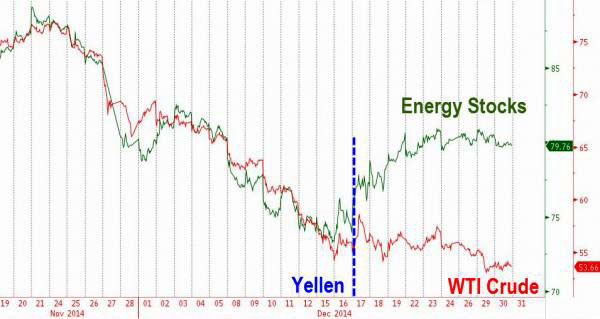|

by Michael Snyder
December 31, 2014
from
TheEconomicCollapseBlog Website

-
Who is to blame
for the staggering collapse of the price of oil?
-
Is it the
Saudis?
-
Is it the
United States?
-
Are Saudi
Arabia and the U.S. government working together to
hurt Russia?
-
And if this oil
war continues, how far will the price of oil end up
falling in 2015?
As you will see below, some analysts
believe that it could ultimately go below 20 dollars a barrel.
If we see anything even close to that,
the U.S. economy could lose millions of good paying jobs, billions
of dollars of energy bonds could default and we could see
trillions of dollars of derivatives
related to the energy industry implode.
The global financial system is already
extremely vulnerable, and purposely causing the price of oil to
crash is one of the most deflationary things that you could possibly
do. Whoever is behind this oil war is playing with fire, and by the
end of this coming year the entire planet could be dealing with the
consequences.
Ever since the price of oil started
falling, people have been pointing fingers at the Saudis. And
without a doubt, the Saudis have manipulated the price of oil before
in order to achieve geopolitical goals.
The following is an excerpt from
a recent article by Andrew Topf…
We don't have to look too far back
in history to see Saudi Arabia, the world's largest oil exporter
and producer, using the oil price to achieve its foreign policy
objectives.
In 1973, Egyptian President Anwar
Sadat convinced Saudi King Faisal to cut production and raise
prices, then to go as far as embargoing oil exports, all with
the goal of punishing the United States for supporting Israel
against the Arab states.
It worked. The "oil price shock"
quadrupled prices.
It happened again in 1986, when
Saudi Arabia-led OPEC allowed prices to drop precipitously, and
then in 1990, when the Saudis sent prices plummeting as a way of
taking out Russia, which was seen as a threat to their oil
supremacy.
In 1998, they succeeded. When the
oil price was halved from $25 to $12, Russia defaulted on its
debt.
The Saudis and other OPEC members
have, of course, used the oil price for the obverse effect, that
is, suppressing production to keep prices artificially high and
member states swimming in "petrodollars". In 2008, oil peaked at
$147 a barrel.
Turning to the current price drop,
the Saudis and OPEC have a vested interest in taking out
higher-cost competitors, such as US shale oil producers, who
will certainly be hurt by the lower price. Even before the price
drop, the Saudis were selling their oil to China at a discount.
OPEC's refusal on Nov. 27 to cut
production seemed like the baldest evidence yet that the oil
price drop was really an oil price war between Saudi Arabia and
the US.
If the Saudis wanted to stabilize the
price of oil, they could do that immediately by announcing a
production cutback.
The fact that they have chosen not to do
this says volumes. In addition to wanting to harm U.S. shale
producers, some believe that the Saudis are determined to crush
Iran.
This next excerpt comes from a recent
Daily Mail article…
Above all, Saudi Arabia and its Gulf
allies see Iran - a bitter religious and political opponent - as
their main regional adversary.
They know that Iran, dominated by
the Shia Muslim sect, supports a resentful underclass of more
than a million under-privileged and angry Shia people living in
the gulf peninsula - a potential uprising waiting to happen
against the Saudi regime.
The Saudis, who are overwhelmingly
Sunni Muslims, also loathe the way Iran supports President
Assad's regime in Syria - with which the Iranians have a
religious affiliation. They also know that Iran, its economy
plagued by corruption and crippled by Western sanctions,
desperately needs the oil price to rise. And they have no
intention of helping out.
The fact is that the Saudis remain
in a strong position because oil is cheap to produce there, and
the country has such vast reserves. It can withstand a year - or
three - of low oil prices.
There are others out there that are
fully convinced that the Saudis and the U.S. are actually colluding
to drive down the price of oil, and that their real goal is to
destroy Russia.
In fact, Venezuela's President
Nicolas Maduro openly promoted this theory during a recent
speech on
Venezuelan national television…
"Did you know there's an oil war?
And the war has an objective: to destroy Russia," he said in a
speech to state businessmen carried live on state TV.
"It's a strategically planned war…
also aimed at Venezuela, to try and destroy our revolution and
cause an economic collapse," he added, accusing the United
States of trying to flood the market with shale oil.
Venezuela and Russia, which both
have fractious ties with Washington, are widely considered the
nations hardest hit by the global oil price fall.
And as I discussed
just the other day, Russian
President Vladimir Putin seems to agree with this theory…
"We all see the lowering of oil
prices.
There's lots of talk about what's
causing it. Could it be an agreement between the U.S. and Saudi
Arabia to punish Iran and affect the economies of Russia and
Venezuela? It could."
Without a doubt, Obama wants to "punish"
Russia for what has been
going on in Ukraine.
Going after oil is one of the best ways
to do that. And if the U.S. shale industry gets hurt in the process,
that is a bonus for the radical environmentalists in Obama's
administration.
There are yet others that see this oil
war as being even more complicated.
Marin Katusa believes that this
is actually a
three-way war between OPEC, Russia and the United States…
"It's a three-way oil war between
OPEC, Russia and North American shale," says Marin Katusa,
author of 'The
Colder War,' and chief energy investment strategist
at Casey Research.
Katusa doesn't see production
slowing in 2015:
"We know that OPEC will not be cutting back
production. They're going to increase it. Russia has increased
production to all-time highs."
With Russia and OPEC refusing to
give up market share how will the shale industry compete?
Katusa thinks the longevity and
staying power of the shale industry will keep it viable and
profitable.
"The versatility and the
survivability of a lot of these shale producers will
surprise people. I don't see that the shale sector is going
to collapse over night," he says.
Shale sweet spots like North
Dakota's Bakken region and Texas' Eagle Ford area will help keep
production levels up and output steady.
Whatever the true motivation for this
oil war is, it does not appear that it is going to end any time
soon. And so that means that the price of oil
is going to go lower.
How much lower?
One analyst recently told CNN
that we could see the price of oil dip into the $30s next year…
Few saw the energy meltdown coming.
Now that it's here, industry analysts warn another move lower is
possible as the momentum remains firmly to the downside.
"If this doesn't hold, we could
go back to price levels in late 2008 and early 2009 - down
in the $30s. There's no reason why it couldn't happen," said
Darin Newsom, senior analyst at Telvent DTN.
Others are even more pessimistic.
For instance, Jeremy Warner of
the
Sydney Morning Herald, who
correctly predicted that the price of oil would fall below $80 this
year, is now forecasting that the price of oil could fall all the
way down to $20 next year…
Revisiting the past year's
predictions is, for most columnists a frequently humbling
experience.
The howlers tend to far outweigh the successes. Yet,
for a change, I can genuinely claim to have got my main call for
markets - that oil would sink to $US80 a barrel or less - spot
on, and for the right reasons, too.
Just in case you think I'm making it
up, this is what I said 12 months ago:
"My big prediction is for
$US80 oil, from which much of the rest of my outlook for the
coming year flows.
It's hard to overstate the significance of a
much lower oil price - Brent at, say, $US80 a barrel, or perhaps
lower still - yet this is a surprisingly likely prospect, the
implications of which have been largely missed by mainstream
economic forecasters."
If on to a good thing, you might as
well stick with it; so for the coming year, I'm doubling up on
this forecast.
Far from bouncing back to the post crisis
"normal" of something over $US100 a barrel, as many oil traders
seem to expect, my view is that the oil price will remain low
for a long time, sinking to perhaps as little as $US20 a barrel
over the coming year before recovering a little.
But even Warner's chilling prediction is
not the most bearish.
A technical analyst named Abigail
Doolittle recently told CNBC
that under a worst case scenario the price of oil could fall as low
as $14 a barrel…
No one really saw 2014's dramatic
plunge in oil price coming, so it's probably fair to say that
any predictions about where it's going from here fall somewhere
between educated guesses and picking a number out of a hat.
In that light, it's less than
shocking to see one analyst making a case - albeit in a pure
outlier sense - for a drop all the way below $14 a barrel.
Abigail Doolittle,
who does business under the name Peak Theories Research, posits
that current chart trends point to the possibility that crude
has three downside target areas where it could find support - $44,
$35 and the nightmare scenario of, yes, $13.65.
But the truth is that none of those
scenarios need to happen in order for this oil war to absolutely
devastate the U.S. economy and the U.S. financial system.
There is a very strong correlation
between the price of oil and the performance of energy stocks and
energy bonds. But over the past couple of weeks this correlation has
been broken.
The following chart comes from Zero
Hedge…

It is inevitable that at some point we
will see energy stocks and energy bonds come back into line with the
price of crude oil.
And it isn't just energy stocks and
bonds that we need to be concerned about. There is only one other
time in all of history when the price of oil has crashed by more
than 50 dollars in less than a year.
That was in 2008 - just before
the great financial crisis that erupted in the fall of that year.
For much, much more on this, please see my previous article entitled
"Guess
What Happened the Last Time the Price of Oil Crashed Like This?..."
(...the beginning of that oil price crash preceded the great
financial collapse that happened later that year by several months.)
Whether the price of oil crashed or not,
we were already on the verge of massive financial troubles. But the fact that the price of oil has
collapsed makes all of our potential problems much, much worse.
As we enter 2015, keep an eye on energy
stocks, energy bonds and listen for any mention of problems with
derivatives.
The next great financial crisis is right around the
corner, but most people will never see it coming until they are
blindsided by it.
|


